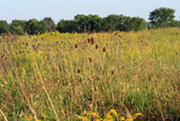Hunting, fishing on campus


The land where the college is now located was undeveloped prairie not so many years ago, one speaker told a group of students on Oct. 13.
Native American writer Phillip Carroll Morgan spoke about his Oklahoma ties to 30 students and faculty members in the Bruce Owen Theater as part of Humanities Week.
Morgan spoke about experiencing OCCC before the school was created.
“I grew up here on the south side of Oklahoma City,” Morgan said.
“I hunted and fished on this very acreage. No shops, no freeway was here.”
Professor Michael Snyder said Morgan gave him a new perspective on the campus.
“I found it fascinating that he had that kind of connection to the school and the land,” said Snyder, who invited both speakers to participate in the event.
“It really inspired me. It made me rethink my ties to the school and the land.”
Morgan played three songs on the guitar and read three poems. He encouraged the audience to sing along with the chorus to the first song, “Jump Down, Turn Around, Pick a Bale of Cotton.”
“I liked the songs,” said Taylor Barnes, music major. She sang along, she said.
Her favorite of the three songs was “Talk’s Cheap.”
“The song is made up of old sayings and a few original ones that my father told me over the years,” Morgan said. “My father followed the Indian stereotype pretty closely, but possessed a good sense of humor.
“He was fair and kind. He was truly a man of few words.”
Barnes said, “It was cool he put [all the advice] together in the song.”
The other speaker, Charles Red Corn, spoke about Osage history and tradition that lasts even in the present.
He spoke about the I lo’n shka dances that take place in Gray Horse, Hominy, and Pawhuska for four days each and have been going on for over 110 years.
“I think the I lo’n shka dance has kept us together,” Red Corn said. “It’s a social dance. It’s part of the glue that holds us together. It’s not just black and white. It works.”
One student said she found the stories worthwhile.
“It was interesting learning the history,” said freshman Nicole Shirallie.
Red Corn also spoke about his novel “A Pipe for February,” which is set in Osage County during the 1920s.
The novel tells four stories, Red Corn said. It covers the discovery of oil and the wealth it brought the Osage; the ancient Osage teachings; how much fun he thought the 1920s were; and the Osage murders and the conspiracies against them to inherit oil rights.
“Over 300 Osages died from inadequately explained causes during the 1920s,”said Red Corn.
“I started out writing the novel and leaving out the murders, but I figured out you can’t do it.”
The novel took him three years to write, Red Corn said.
Professor Stephen Morrow opened the evening, and Snyder introduced both speakers. Morrow and Snyder, as well as Professor Bertha Wise and Professor John Inglett, shared personal works after intermission.
To contact Michelle Borror,
email onlineeditor@occc.edu.